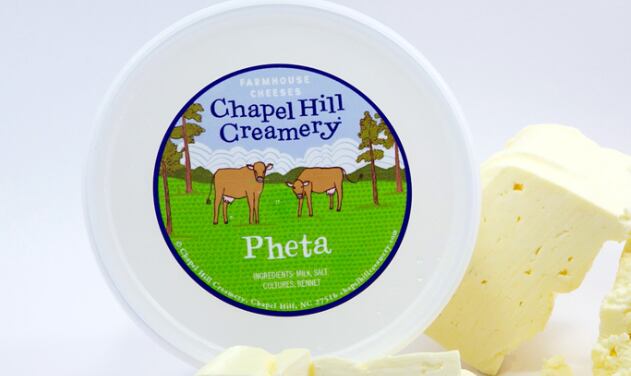The agency said investigations indicate some cases had Dunsyre Blue, manufactured by Errington Cheese, prior to becoming unwell. The cases developed symptoms between 2 and 15 July.
A total of 14 ill people are in Scotland and two are in England with two of the 16 patients being treated in hospital.
The incubation period for E. coli O157 is three to four days but can be up to two weeks.
Errington Cheese said completed testing to date has been clear of E. coli O157 with some results still pending.
Humphrey Errington, founder of the company, told us it has tested every batch from the last three months and it has not stopped producing cheese.
"As we understand it out of the 16 ill people, it is alleged seven may have eaten Dunsyre Blue. At the moment we are baffled why [the authorities] think there is a link and the more tests we do the more baffled we are. Why they think there is a link, we haven't been given much information so we don't really know," he said.
"They contacted us in the second half of last week about our procedures...they said they were worried about two batches, we are a responsible producer so we co-operated and recalled the two batches. As far as I'm aware there are no concerns of other Dunsyre Blue."
Ashwood UK Microbiology and Chemistry laboratory based in Peeblesshire, Scotland carried out the testing.
Investigation and recall
Food Standards Scotland (FSS) said it was working with South Lanarkshire Council and Errington Cheese to investigate.
It added Dunsyre Blue cheese purchased between 18 May and 29 July with batch codes C22 and D14 should not be consumed.
The agency advised vulnerable groups including pregnant women, children and the elderly not to consume unpasteurised milk and dairy products due to the increased risk of food poisoning.
Errington Cheese recalled two batches of Dunsyre Blue cheese because they may contain E. coli O157 (VTEC).
All pack sizes with batch number C22 best before date 19 to 26 July and D14 best before 7 to 15 August are affected.
Distribution is mainly to hotels, restaurants and delicatessens but not supermarkets.
The Food Standards Agency (FSA) also carried the recall notice.
Laboratory testing has shown the cases are not related to the outbreak in England associated with eating mixed salad leaves.
Dr Syed Ahmed, Clinical Director at HPS, said: "The majority of cases have consumed Dunsyre Blue while eating out, but members of the public who purchased Dunsyre Blue cheese between 18 May and 29 July, and still have the product in their fridges, should return it to the retailer where they purchased the product or dispose of it.
“Symptoms associated with E. coli O157 can include stomach cramps, diarrhoea (often bloody), vomiting and occasionally fever.
“It is important to maintain good hand and food hygiene practices at all times as this reduces the risk of passing the infection to others.”
Chapel Hill Creamery link to Salmonella illnesses
Meanwhile in a different incident, Chapel Hill Creamery in North Carolina has recalled all its cheese because of a link to an outbreak of Salmonella.

Salmonella infection has been identified in people who ate Chapel Hill Creamery products.
A matching strain has been found in milk from the creamery used during preparation of the cheese products.
Products were distributed through retail locations, Farmer’s Markets or restaurants throughout North Carolina, Tennessee, South Carolina, Virginia and Georgia.
Colleen Bridger, Orange County health director, told us it was investigating more than 100 cases of Salmonella that have the same strain as the raw milk that tested positive.
However, as it was a fairly common strain the state lab is doing genetic testing to determine exact matches and it will be weeks before exact numbers are known.
Asked why all products were withdrawn, she said for Chapel Hill Creamery it was the fastest, most conservative approach.
"The owners wanted to err on the side of caution and therefore pulled all their cheeses until the investigation could more definitively identify the source," she said.
Portia McKnight, co-founder of the creamery, said: "Although there is not yet a definitive link between the CHC cheese and the illnesses, there is enough evidence to implicate the cheese and we are asking customers to not consume these cheeses or use them in food service.”
Chapel Hill Creamery, the North Carolina Department of Agriculture and Department of Health and Human Services and the Orange County Health Department are trying to identify the source of the Salmonella and which cheeses are affected.
